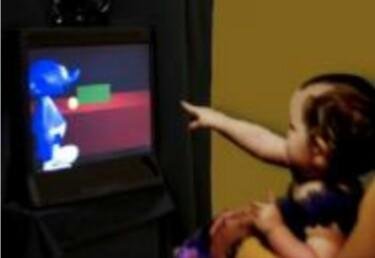Baby Feel Faster Than Expected

Babies can feel that what others believe is not always the same as reality. #
Although your baby is very smart, he may not be able to read your mind, he does not even know about it. New research indicates that 7-month-old infants are sensitive to other people's perspectives. But more studies are needed to demonstrate whether the baby really understands that others have their own beliefs.
The new study, published December 24 in the journal Science, enriches research exploring when humans first develop the ability to predict the intentions and perspectives of others, a cognitive ability termed "mind theory". Scientists have long debated whether this is an outward ability or something that arises when the baby's brain gathers information and experiences.
Previous research has indicated that children can not distinguish between what others believe and what actually happens until they are 4 or 5 years old. This development is explored in a classic experiment in which children see a Maxie boah put chocolate into a kitchen drawer. Maxie then left, and someone came and moved the chocolate to the closet. Maxie then comes back and asks for his chocolate. The children were then asked whether Maxie would go to the drawer, where he placed the chocolate, or the cupboard, where the chocolate was actually located.
Three-year-olds say Maxie will go to the drawer, says cognitive development specialist Josef Perner of the University of Salzburg, who conducted Maxie's experiments in the early 1980s. Although Maxie did not know the chocolate was in the closet, the 3-year-olds did not seem to understand that the real chocolate was not where Maxie thought. "Only about four or five children realize that he is not acting in the true world, but acting in his own world." Similarly, as quoted from ScienceNews (23/12/10).
The new study involves similar experiments, also using a test of "false beliefs" that aim to get whether the children understand that other people can have confidence in their minds that are inconsistent with reality. 7-month-old babies watched a video of a smurf-like creature that placed a ball on the table, which rolled behind the bulkhead so that it was invisible. The creature goes, and the ball stays or moves again. As the creature returns, the bulkhead is lowered to indicate whether the ball is there. Sometimes his ball is consistent with what the creature sees, but sometimes, as with Maxie and his chocolate, the creature has a false belief about the location of the ball, expecting the ball in the place where it last saw it.
Babies looked on the screen longer when the creature's allegations about the ball did not match the actual ball location, the researchers report. This indicates that infants younger than 1 year understand about other people's beliefs, says Ágnes Kovács of the Hungarian Academy of Sciences in Budapest, who led the study.
Research does indicate that infants give different attention to people rather than objects, a view that is important for the development of the theory of mind. "Many new studies show that babies have a more elaborate understanding of the minds of others than we think," says psychologist Alison Gopnik of the University of Calfornia, Berkeley. "They treat people special from the beginning."
But drawing conclusions about a human mind that has not yet been able to speak is filled with difficulties, he notes. Using how long a baby looks at something can be a clarifying metric but must be coupled with behavioral tests, just as a baby also grabs certain objects, Gopnik says.
Perner notes that in Maxie's experiment, even though a 3-year-old boy says that Maxie is going to the closet, they spend some time looking into the drawer, probably because their brains try to overcome colliding thoughts.
He and others added that the new study design could have been stronger. For example, the experiment does not test how the baby will react when seeing the ball come and go in the absence of the creature.
Still, the study is investigating important things, says Perner. "The study remains interesting because the study shows that very young babies pay attention to the things that are true."
***
*